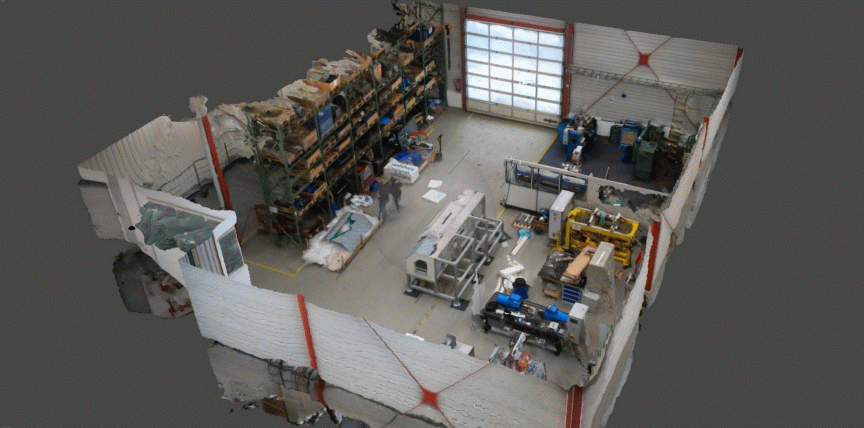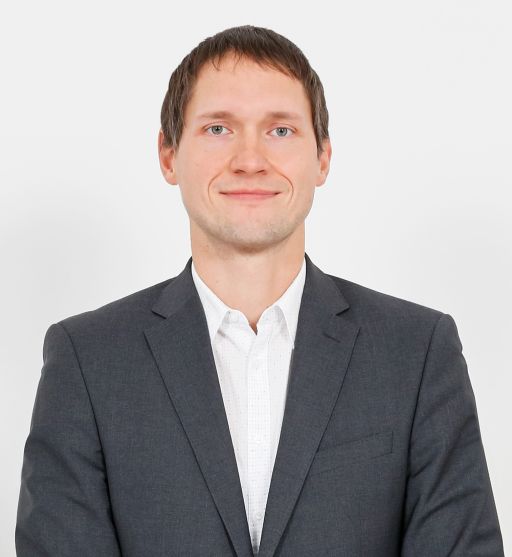Hannover Region Economic Development Agency supports drone research

Basic research and innovation are generally teamwork. Experts, companies and institutions join forces and competencies to make technological progress possible. Not forgetting the often decisive financial and institutional support from the public sector.
For example, the "Instant Factory Maps" research project, the results of which provided the basis for the upcoming evolution process, was funded by the Federal Ministry of Economics. Thousands of images are taken by drone and processed into a 3D point cloud using photogrammetry software.
The "Instant Factory Maps" technology now makes it possible to split the data into numerous smaller 3D point clouds and thus recognize individual objects - such as machines, systems, shelves or pallets. "We can then edit the 3D layout in a CAD program. For example, we can move systems to a different location, delete or add machines and plan a new factory layout in this way," explains project engineer Dominik Melcher from the Institute of Integrated Production (IPH) in Hanover.
What currently still requires the presence of a pilot to navigate the drone through the area to be mapped so that a complete, three-dimensional data set can be created, unmanned aerial vehicles should be able to do anywhere in the world in future without any human assistance. At least that is the aim of the "Autodrone" project, which is scheduled to start in fall 2020 and is set to run for two years.
In addition to the greater flexibility that comes with a pilot-independent system, the possible period of use is also to be extended. To date, drone flights can only be carried out outside of ongoing operations due to occupational health and safety issues. However, the vision of the engineers at IPH is that the drones can be permanently integrated into operations at any time in the future in order to incorporate real-time data into planning processes and avoid machine downtimes.
Application
The Hannover Region Economic Development Agency already supported the IPH during the application process in acquiring project partners to help transfer the project content and results into business practice as quickly and efficiently as possible.
Project implementation
During the implementation of the project, the business developers will also be involved in the advisory board meetings. At these meetings, the application ideas collected from the regional drone community can be compared with the new technical possibilities. This will provide the institute with additional information from the field - including from companies that are unable to attend the meeting due to time constraints. At the same time, the companies learn which new technologies will become available in the near future. In some cases, this also leads to companies that previously had no connection to drones agreeing to implement a study in their own company.
This exchange often results in new application ideas that are discussed in subsequent network meetings, such as the Copter Days organized by the Hannover Region Economic Development Corporation. The resulting intensive exchange also forms the basis for further research and innovation projects. Through this cycle, the Hannover Region attempts to continuously strengthen the activities of developers and users.
The IPH also aims to continuously develop the possibilities of integrating drones into industrial production processes. With the "DroMaTra" and "Instant Factory Maps" projects, important basic research has already been carried out in this area - embedded in the constantly growing drone network of the Hannover Region.
"Continuous consideration and optimization of the factory layout is an important building block for manufacturing companies to maintain their competitiveness," explains IPH project manager Dominik Melcher.
In addition to the technology, the regulatory aspect of an autonomous aircraft within ongoing production processes will therefore also be addressed.
"Considering the safety aspect is a major part of the planned research project," emphasizes Melcher. "This is because there are currently no laws or standards for the use of drones inside factories, where technology is currently advancing in terms of legislation."
One more reason why it is good to be able to rely on a broad network and public bodies such as the Hannover Region Economic Development Corporation for the "Autodrone" project.
This article was produced in collaboration with Drones magazine, the trade journal for the commercial use of civilian drone technology.www.drones-magazin.de
Contact us
Dr. Michael Merwart
Hanover Region
Economic Development
Department of Economic Development and Employment Promotion

